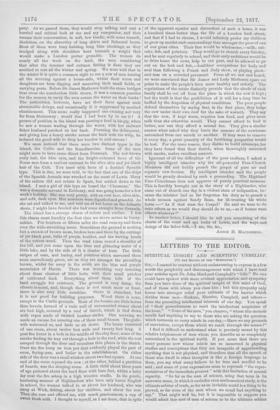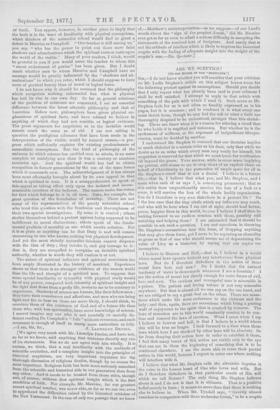LETTERS TO THE EDITOR.
SPIRITUAL INSIGHT AND SCIENTIFIC UNBELIEF.
[TO THE EDITOR OF THB SPROTAT011.1
SIR,—I cannot be content without endeavouring to express in a few words the perplexity and discouragement with which I have read your articles upon Dr. John MacLeod Campbell's "Life." No one could have spoken with more evident appreciation and sympathy than you have done of the spiritual insight of this saint of God, and of those with whom you class him ; but this sympathy only forces into stronger relief your estimate of the barrier whicit divides these men—Erskine, Maurice, Campbell, and others— from the prevailing intellectual interests of our day. You speak of "their powerlessness to meet the intellectual scepticism of the hour." "None of the men," you observe, "whom this memoir recalls had anything to say to those who are asking the question which torments so many minds in our day,—Have we any grounds of conviction, except those which we reach through the senses?"
I find it difficult to understand what is precisely meant by this relative helplessness of men whom you describe as so completely naturalised in the spiritual world. If you mean that there are many persons now whose minds are so immersed in physical studies and conceptions that they are incapable of apprehending anything that is not physical, and therefore that all the speech of those who dwell in other thoughts is like a foreign language to them, you say what many believe to be true and needful to be said ; and some of your expressions seem to reproach "the repre- sentatives of the immediate present" with this limitation of mental capacity. "So far as the man of science, using that term in its narrower sense, in which it excludes even mathematical study, is the ultimate arbiter of truth, so far as an invisible world is a thing to be proved, so far none of the men whom we recall had anything to say." That might well be, but it is impossible to suppose you. would admit this sort of man of science to be the ultimate arbiter
of truth. You appear, however, in another place to imply that the fault is in the want of familiarity with physical conceptions, which thinkers of the naturalist school wonld find so great a defect in Maurice or Campbell. "One teacher is still among us," you say, "who has the power to point out those mere faint shadows and adumbrations which the spiritual cosmos casts upon the world of the visible." Many of your readers, I think, would be grateful to you it you would name the teacher to whom this "rarest endowment of genius" has been given. But I doubt much whether men to whom Maurice and Campbell have no message would be greatly influenced by the "shadows and ad- umbrations" to which you refer, which I should suppose to have more of poetical beauty than of moral or logical force.
I do not know why it should be assumed that the philosophy which recognises nothing substantial but what is physical has had its rise in our own day. So far as general solutions of the problem of existence are concerned, I see no essential difference between the latest atheistic philosophy and that of Lucretius. Before now, philosophers have given physical ex- planations of spiritual facts, and have refused to believe in anything of which they had not sensible or logical evidence. The great arguments for scepticism as to the invisible world remain much the same as of old. I am not calling in question the prodigious advances that have been made in the interpretation of the visible world by natural causes,—a pro- gress which sufficiently explains the existing predominance of naturalistic conceptions. But the kind of philosophy of the universe to which science has enabled men to attain, is no more complete or satisfying now than it was a century or nineteen centuries ago, And the spiritual world has had to obtain_ recognition in former generations by the use of the same forces which it commands now. The acknowledgment of it has always been most effectually brought about by its own appeal to that which is spiritual in man. It is a misapprehension to speak of this appeal as taking effect only upon the isolated and incom- mtinicable intuition of the believer. The unseen realm has voices for that which belongs to it in all men. Take, for example, the great question of . the foundation of morality. There are not many of the representatives of the purely naturalist school who treat this question with the frankness and thoroughness of their own special investigations. By some it is evaded ; others shelter themselves behind a protest against being supposed to be indifferent to moral distinctions ; others speak of the funda- mental problem of morality as one which awaits solution. Bat it is as plain as anything can be that Duty is and will remain unmeaning to one who knows nothing but physical development. And yet the most strictly naturalist thinkers cannot dispense with the idea of duty ; they invoke it, and pay homage to it : that is, they are compelled to recognise an invisible spiritual authority, whether in words they will confess it or not.
The nature of spiritual influence and spiritual conviction has been amply illustrated in the history of mankind. Experience shows us that there is no stronger evidence of the unseen world than the life and thought of a spiritual man. To suppose that some special familiarity or sympathy with physical study would, be of any power, compared with intensity of spiritual insight and the light that flows from a godly life, seems to me to be contrary to experience. Students of science are human, like their fellow-men ; they have their consciences and affections, and men who can bring light and fire to bear on these are more likely, I should think, to convince them of the existenee of God and of a future life than these who, with less spirituality, have more knowledge of science. I cannot imagine any one who is not mentally or morally de- hclent reading Dr. Campbell's " Life" without reverence, and such reverence is enough of itself to stamp mere naturalism as folly.
..—I am, Sir, &c., J. LLEIVELYN DAvras.
[We agree very much with Mr. Llewelyn Davies, and have not, so far as we know, said anything that traverses directly any one of his statements. But we do not agree with him wholly. It is certain, we think, that a real familiarity with the methods of scientific evolution, and a complete insight into the principles of historical scepticism, are very important requisites for the thorough discussion of religious doubts, though by no means the most important. Religious faith has been more seriously assaulted from the scientific and historical side in our generation than from any other. And it needs to be treated from those sides, though
not of course, without that spiritual insight which is the firstcondition of faith. For example, Mr. Maurice, far. our greatest
recent spiritual teacher, was never able, as far as we can see, even to apprehend the difficulties raised by the historical criticism of the New Testament. In the case of only one passage that we know of,—Matthew's misinterpretation—as we suppose—of our Lord's words about the "sign of the prophet Jonah," did Mr. Maurice ever get so far as even to admit a serious difficulty in accepting the statements of the received text of Scripture. And surely that is not the attitude of intellect which is likely to impress the historical sceptic with the feeling of adequate insight into the weight of the sceptic's case.—En. Spectator.]































 Previous page
Previous page